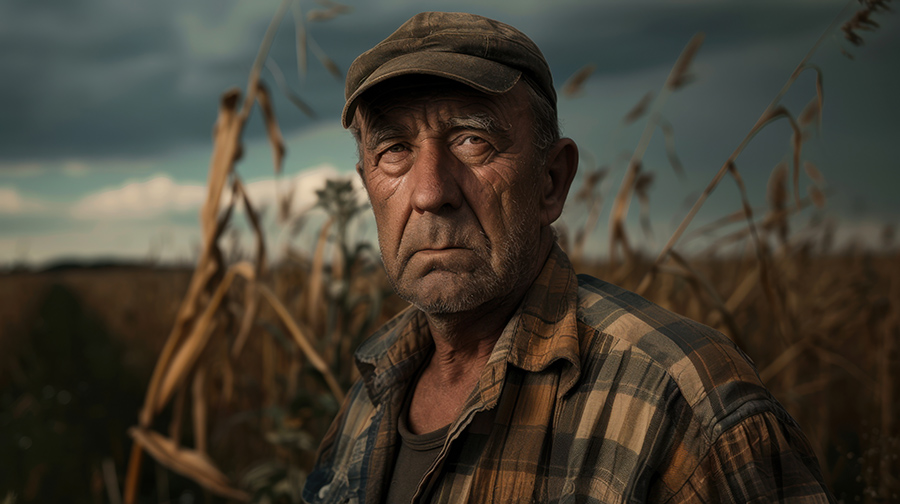Canadian farmers bearing brunt of global geopolitics
Connor McDowell,
Local Journalism Initiative Reporter
The livelihoods of farmers are increasingly being impacted by global geopolitics, a market analyst said during a trade presentation at Manitoba Ag Days on Wednesday.
Speaking at the three-day annual event that draws thousands from the Westman region and beyond, including the United States, market analyst Mike Jubinville’s presentation, entitled “A Tangled Trading World,” focused on the economic reverberations felt in the agriculture sector that stem from political battles.
Jubinville — an analyst for MarketsFarm — spoke about the prices of various agricultural crops grown in Manitoba, citing the example of China repeatedly targeting the local canola industry as a way to pressure Canada, and to lower sales prices. He also touched on the impending trade tariffs announcement expected from the U.S. in the coming days, saying that also stems from political differences.
“We are (being) subject to these political manipulations in the marketplace that I don’t think I’ve seen in the 30 years I’ve been in (the industry),” said Jubinville. “(Basics like supply and demand) seem to take a back seat to the political issues that are at play.”
Jubinville pointed out that Canadian canola is selling at roughly $1.50 below its true trading value due to such conflicts.
Canadian farmers have been hit by such politicking several times in recent years, Jubinville stated later in an interview with the Sun. He said it goes back to as early as the year 2018, when a Huawei executive was detained in Canada, and as a result, China — the top importer of Canadian canola — slashed its canola purchases for two years.
“China immediately cut off canola exports from Canada and didn’t punish the Americans at all, even though they were the ones that were behind it,” said Jubinville. He added China is typically the biggest buyer of our canola, accounting for up to 60 per cent of total Canadian exports.
When these factors come into play in the market, farmers in Manitoba suffer, Jubinville said. The value of Canadian canola drops because buyers see the market as risk-ridden and unpredictable, which is not good for business.
Jubinville also pointed to the year 2024, when China again targeted Canadian canola exporters in what he calls a retaliation against Prime Minister Justin Trudeau. Jubinville said the prime minister’s comment about taxing Chinese electric vehicles created another issue for Manitoban farmers — in the form of an investigation launched into Canada’s canola trading practices.
“Don’t consider it a coincidence that this (canola) anti-dumping investigation was announced almost immediately after,” said Jubinville. “To me, it’s bogus.”
In a media scrum at Ag Days on Tuesday, Premier Wab Kinew told reporters that he has “plans in place” to fight back if the United States imposes tariffs on Canada. Kinew did not offer further details, saying there is huge public interest dependent on playing his cards right.
U.S. President Donald Trump has also alluded to potentially imposing steep trade tariffs after being elected as political payback for unrelated issues, such as the high number of illegal immigrants entering the U.S. via its shared border with Canada.
In response, Kinew has reiterated that he would put Manitobans first as he negotiates to quell these political and economic threats.
“We’re making the case right now that our trade relationship is important (to Americans),” he said on Tuesday. “I can reassure you that the premiers are stepping up.”
Kinew added that he is focused on maintaining a strong relationship with the United States. He cited the progress made so far, such as a new trade office that will be opened in Washington, D.C., in the coming months, with a trade advocacy team from the province planning a visit in February.
At the end of the day, however, Kinew said Manitobans cannot replace U.S. as a trading partner. The country represents a large share of many exports from the agricultural industry.
Commenting on future negotiations, Kinew pointed to three features he can leverage during talks on behalf of Manitobans: arctic sovereignty, national security and Hudson Bay. Kinew called the bay a “really big card we have” in that Manitoba can build export routes through the shipping port in Churchill, where the bay offers a passage to connect to the Atlantic Ocean.
Besides U.S. and China, Jubinville said Canadian agriculture has also been adversely impacted by the war in Ukraine. He added that Russia has had record wheat harvests in the past few years and has been ramping up sales. As a result, the global wheat market has been absorbing an increased supply from Russian farmers.
But something good is on the horizon for Canadian producers, according to Jubinville. Even as wheat buyers are only currently buying for short-term needs, they will need to restock their reserves at some point. That should exert strong upward pressure on crop prices, resulting in better profits for Canadian wheat growers.
Connor McDowell,
Local Journalism Initiative Reporter
Brandon Sun







